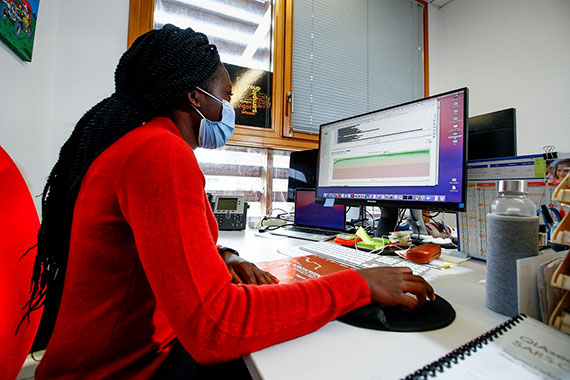Sequence data management and sharing
To rapidly alert the health authorities and international community should variants of interest emerge.

10957
Number of sequences shared on GISAID starting July 2021
The WHO, in its global strategy for genomic surveillance , has emphasized the importance for all countries to establish a genomic surveillance system for SARS-CoV-2 and to rapidly share information in public databases in order to understand and eradicate the virus on a global scale.
In Africa today, sequences have been obtained and uploaded to the GISAID public database for less than 1% of reported Covid-19 cases.
The AFROSCREEN project strengthens the genomic surveillance system in each country, where it is in place, and supports its development where it does not yet exist.
The implementation of routine genomic surveillance of variants in laboratories is accompanied by the very rapid availability of results to national health authorities and the international community, for example through the public platform GISAID.
This allows for phylogenetic analysis of the sequenced strains. In addition to identifying variants of concern (VOCs), it also enables molecular epidemiology studies on the circulation of SARS-CoV-2 strains in Africa and estimates of the date and place of their emergence with molecular clock and phylogeography analyses.
The ultimate goal of the project is to make sequencing and epidemiological data available to help decision-makers define public health priorities and preventive measures to control and limit the circulation of variants.
The open-access platform GISAID facilitates the rapid sharing of data on all flu viruses and the coronavirus responsible for Covid-19.
This includes the genetic sequences and the clinical and epidemiological data associated with the viruses (sex, age, date and place the sample was taken, vaccine status, etc.), to help researchers understand how the viruses evolve and spread during epidemics and pandemics.
The World Health Organisation (WHO) classifies the variants of interest (VOIs) and variants of concern (VOCs) according to their potential risks to public health: increased transmissibility, diagnostic failure, reduced efficacy of natural and vaccine-induced immunity, and reduced sensitivity to treatment.
Molecular epidemiology is a branch of epidemiology that uses molecular markers to describe or analyse pathological phenomena. It makes it possible to link, epidemiologically, clusters of an infectious disease by tracing the strains of the pathogenic agent and to identify chains of transmission.
